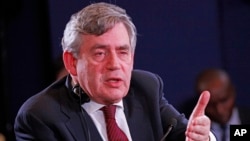U.N. Special Envoy for Global Education, Gordon Brown, is urging international support for a number of initiatives to get 28 million children back to school in conflict and crisis zones around the world.
Education envoy Brown said schools used to be safe havens for children but are increasingly becoming instruments of war, with more than 10,000 attacks on schools across the globe in the last five years.
Brown, a former British prime minister, urged the international community to invest in making schools safer, calling for the establishment of a multi-million-dollar global humanitarian fund for education in emergencies.
“It is our moral duty to make sure that every single child in the world can enjoy the basic right to education - free of terror, free of fear, and with the support of the international community," said Brown.
New uses for technology is one way he is looking at improving school safety.
Working with a U.S.-based technology firm, Predictify.Me, a pilot program is being started in Pakistan, where three months ago the Taliban attacked a school in the northwest city of Peshawar, killing 140 children.
Now, a thousand schools in four provinces and Islamabad will benefit from new computer software to assess safety and recommend ways to improve it.
Brown said it is a major step forward in a country where more than five million children do not go to school.
“We have now a means by which we can hold the government and the schools accountable for whether they are fortifying the schools, whether they are making the schools safer and whether, of course, they are monitoring the possibilities of terrorist attacks," he said.
The special envoy also called for the release of the more than 200 girls kidnapped by Boko Haram militants in the northern Nigerian town of Chibok nearly one year ago. He said more than 10 million children are out of school in Nigeria - the most anywhere in the world.
His Safe Schools initiative has helped marshal $30 million for protecting Nigerian schools. One way it helps young people get back to learning is through transferring students who attend schools in the highest-risk areas affected by Boko Haram to ones in safer regions.
The Syrian conflict has shut three million children out of school, many for several years. A half million of them are refugees in neighboring Lebanon. Envoy Brown is working with the Lebanese government on a “double shift” plan - Lebanese children would attend public schools in the morning and Syrian kids would attend the same schools in the afternoon.
Brown said it is time the international community wakes up to the struggle going on for the rights of vulnerable children and stop turning its back on the victims of war.








